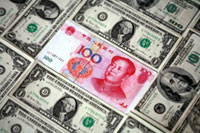China to continue propping up the US dollar?
By Kindred Winecoff

China and the United States have had a trade imbalance for quite a long time. In theory, when one country (the U.S.) imports more goods from a country (China) than it exports to it, the value of the currency of the importing country (the dollar) sinks relative to the value of the currency of the exporting country (the yuan). At least, this is supposed to happen when the value of currencies is allowed to float.
If the value of the dollar sinks relative to the yuan, then imports from China to the U.S. become more expensive, while exports from the U.S. to China become less expensive. Therefore, exports from the U.S. should rise while imports from China should fall. The price mechanism prevents countries from running persistent trade deficits that can have adverse long-run effects on employment.
In the real world version of this example, China has subsidized its exports to make them cheaper, and has then used the proceeds from the trade imbalance to buy U.S. Treasuries and other dollar-denominated assets, thus propping up the dollar and making Chinese imports even more attractive to U.S. consumers.
For a long time, the U.S. was more than happy to oblige, because this made it possible for us to extend cheap credit to businesses and consumers without generating a lot of inflation. The U.S. was running at or near full employment, so there seemed to be little short-run downside. China was content with this state of affairs because it allowed them to employ millions of its impoverished citizens in labor-intensive exporting industries, thus raising standards of living for the most people in the shortest amount of time.
However, everyone knew that in the long run this trade imbalance was unsustainable. This is why people like Nouriel Roubini have been predicting a currency crisis in the U.S. for several years now: eventually the dollar was going to have to fall. According to Roubini and others, the bigger the trade imbalance became, and the larger the U.S. national debt grew, the more painful the inevitable transition was going to be.
A gradual adjustment is always preferable to a sudden shock, so the U.S. has been cajoling the Chinese to let the yuan rise against the dollar in stages. The Chinese have done this, but the U.S. has been concerned that the process is going too slowly. The Chinese have been reticent to move too quickly and forego the employment gains in their exporting sector.
Now that the U.S. is well below full employment, the matter has become more urgent: we need the dollar to decline some in order to boost our exporting industries and spur employment. Despite interest rates close to zero, the dollar has actually gained value against many of the world's currencies since last Fall. Unfortunately, China is facing a slowdown as well, and they want to keep their employment levels from slipping, so they want to keep the yuan from rising much more in the short run.
Click here to read the ful text of the article
Subscribe to Pravda.Ru Telegram channel, Facebook, RSS!




